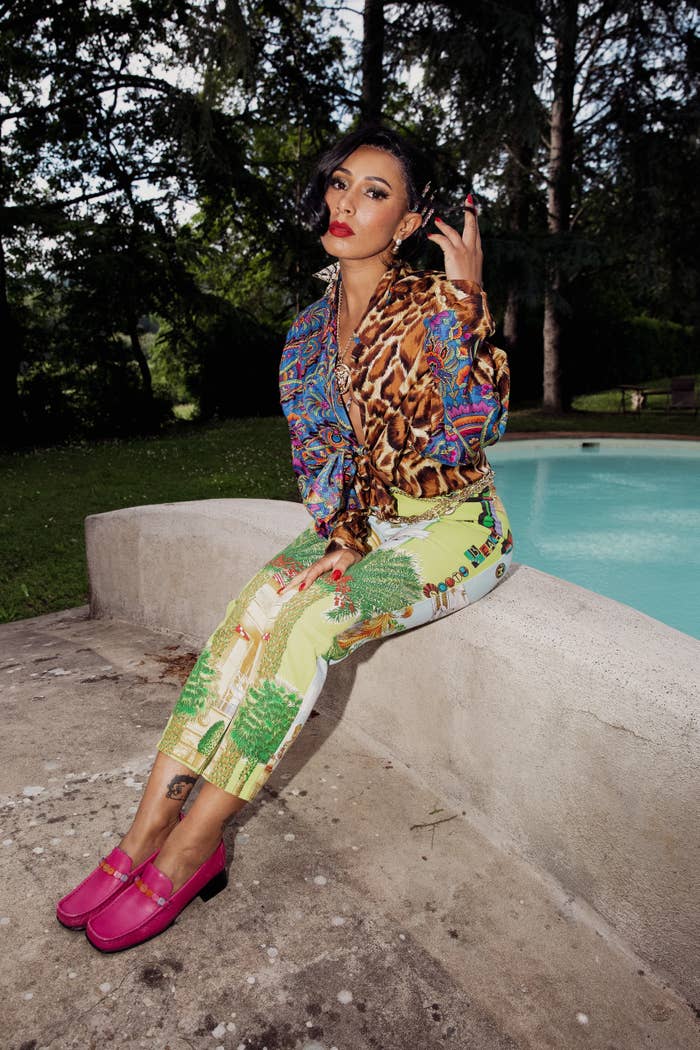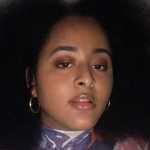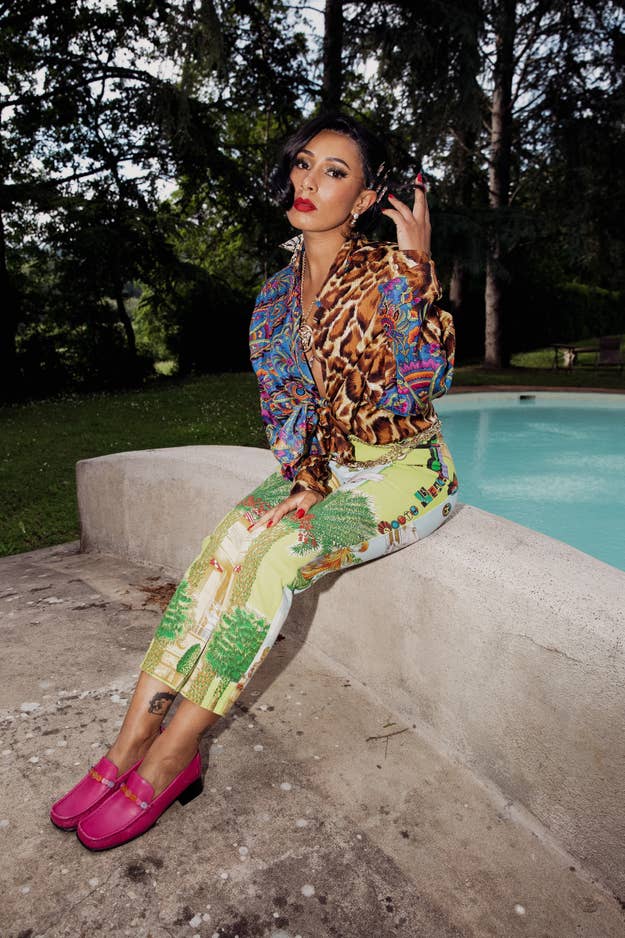
Britain’s underground dance music scene has undoubtedly weaved the fabric of culture, fashion and history of what we consume today as popular culture—think rave culture’s influence on the Y2K fashions we sport, or the way grime paved the way for the drill and rap that dominates the charts.
For the most part, underground dance music has stayed proudly underground, with pride in self-sufficiency and the cultural authenticity of indie labels. However, in the summer of 2022, the underground and overground collided in a major way when East London DJ, producer and vocalist Eliza Rose’s “B.O.T.A. (Baddest Of Them All)”—a track she made with Manchester’s Interplanetary Criminal—hit No. 1 on the UK singles chart and sat comfortably in the Top 10 internationally. A tribute to ‘90s dance, with a nod to Eliza’s deep-rooted UK garage influences, “B.O.T.A. (Baddest Of Them All)” signalled the return of underground dance music to the mainstream (post-pandemic), and has since allowed a new generation of artists—such as Jazzy, Charlotte Plank and Venbee—to stake their claim, too.
The collab with Interplanetary Criminal happened over DM. He sent a flip of cult 1991 house hit, “Let The Beat Hit Em”, Eliza wrote the (uber-catchy) hook after taking inspiration from a poster of the ‘70s Blaxploitation film, Coffy starring Pam Grier, and the rest was history. Tracks with Mura Masa (“Better Now”), The Martinez Brothers (“Pleasure Peak”), and Calvin Harris (“Body Moving”) soon followed.
Eliza is a product of her East London upbringing, from a fateful work experience stint at a local record store at the age of 15—where she would delve headfirst into a love of vinyls that would then inform her work as both a DJ and producer—to playing at and frequenting the underground basements of Hackney clubs such as Visions and The Alibi, gems that no longer exist as a result of gentrification.
Ahead of her set at Circoloco x The Warehouse Project in Manchester this weekend, we caught up with Eliza Rose to talk newfound fame, staying authentic, and the importance of community.
“If the success of ‘B.O.T.A.’ had happened to me when I was 21, I would’ve gone off the rails! I can go into things with a clear head now and understand the opportunities given to me and how to navigate them.”
View this video on YouTube
COMPLEX: Congrats on the release of your new single, “Body Moving”, with Calvin Harris! I understand it all started from a DM Calvin sent you last year, but it’s a big indicator of your fame and popularity—which is a stark difference to the underground scene you were operating in before. How are you finding it all?
Eliza Rose: Acclimatising was difficult at first because, all of sudden, you have all these eyes on you, with all these expectations. In the past few months, I’ve taken back full control of my output with the view of making music that I can look back at in my sixties or seventies and be proud of.
Although it may seem as though you came out of nowhere after the success of “B.O.T.A.” and the subsequent singles, this has actually been over a decade in the making, right?
I think my career taking off when it did was perfect timing because now I really know myself as an individual and an artist, regardless of people’s opinions. If the success of “B.O.T.A.” had happened to me when I was 21, I would’ve gone off the rails! I can go into things with a clear head now and understand the opportunities given to me and how to navigate them. I started my own label, Rosebud Recordings, in 2022, before “B.O.T.A.” and all the success that brought, so that I could release music on my own terms—house and garage with soulful vocals, but in an old-school flavour kinda way that still taps into how much I loved vinyl culture.
What influences your sound? It has a distinctly London feel to it, for sure.
My parents weren’t really big music heads so I had to go out and find the music I liked. Soul and jazz influences came from the record shop I worked at when I was 15 and stayed at for over a decade. I got into all of this because I loved Amy Winehouse and wanted to delve into her influences, so I got into Nina Simone, Billie Holiday and Esther Phillips. The dance element of my sound was shaped mostly by raving at the age of 15 at places like the Opera House and Rudolph where they were playing garage music in its prime. The fact that garage uses a lot of soulful R&B samples anyway just ties into it. That uniquely London garage sound, fused with soulful vocals, has shaped my artistry in all its facets: how I sing, how I play, and how I produce.
Would it be fair to say that your artistry has been shaped by your curiosity?
I think it’s a balance of curiosity and fate. I ended up at Flashback Records, the record store in Shoreditch, because it was the only place left that could take me on for work experience. If I hadn’t worked there, I wouldn’t have become a DJ from falling in love with songwriting. My songwriting has also been shaped by my other interests: I love reading and have a creative writing masters degree, and these have helped with my most important aim when creating, storytelling. Naturally, I put a lyricism into my writing without spending too long mulling over one word, which is what I used to do. When I’m writing a song, I usually have a music video in my head that I want to convey, so that others can understand my vision through my lyrics and how my music makes them feel.
“I’ve written a book as part of my Masters course and maybe, one day, I’ll release a book—but I’ve got enough on my plate for now… Writing is like a brain exercise for me; some people do sudoku, I do creative writing!”
Storytelling is definitely fuelled by reading and consuming other people’s creativity to some extent. What are some of your favourite books?
Giovanni’s Room by James Baldwin, Wide Sargasso Sea by Jean Rhys—I love anything by Jean Rhys. At the moment, I’m reading The Fraud by Zadie Smith, which is my favourite book of hers. I’ve written a book as part of my Masters course and maybe, one day, I’ll release a book—but I’ve got enough on my plate for now [laughs]. Writing is like a brain exercise for me; some people do sudoku, I do creative writing!
Before “B.O.T.A.” soared into the mainstream charts, you’d spent over a decade building your career on the underground scene as a producer, DJ and vocalist. How do you balance the two worlds today?
I think it can be a struggle at times because it’s been such a huge jump. What I’m trying to do now is exist in both spaces by incorporating the two. It can be quite daunting to go from playing underground parties to then shoot to the top of the line-up at huge festivals—you’re always putting yourself on the line as a DJ, which can be difficult. There can be a little bit of a stigma but I do what I want, and allowing myself to straddle the two irrespective of other people’s opinions is important. I’m capable of doing both and enjoy them both, so I’ll just keep going.
Underground scenes nurture a lot of community in a way that isn’t sustainable in commercial spaces—why is community important to you and your work?
The underground scene, by virtue of it being so much smaller, is easier to hold people accountable in. The people are more open-minded and it’s easier to find pockets of people and communities that align with your morals and values as well as your music taste. Community is important because my music and my shows are all about celebrating authenticity and spreading joy. An Eliza Rose show is an experience for people to feel included and joyful, and community is intrinsic in allowing that authenticity to flourish. I try to live and express myself authentically every day, which is a privilege that I want to enjoy and create in my output.
View this video on YouTube
Although your music taps into ‘90s house and ‘00s garage, it feels more future-facing than nostalgic.
Lady Miss Kier is one of my major inspirations in style and music, who has similar values that I express—it’s just that mine are repackaged through a modern lens. CASISDEAD’s storytelling is so amazing it’s almost cinematic in the drama he creates. Honey Dijon is true to herself and is somebody I always reference when it comes to being an example of authenticity. Doja Cat and Megan Thee Stallion are also an inspiration, in that they’re women doing what they want irrespective of what anybody thinks.
What do the next twelve months look like for Eliza Rose?
Last year was very single-led, which was cool to introduce myself to the world, but didn’t necessarily give the full picture of who I am as an artist or my creativity in a body of work. I have a neo-soul track that goes back to my roots, and two other soulful garage-tinged tracks that I’ve been sitting on for years. It’s ironic because there's a track on there produced by MJ Cole, and another produced by a New York-based producer called Jeff, who makes music that reminds me of early MJ Cole—which is kind of full circle to my influences. Nothing is set in stone but all the underlying influences of my artistry will be more influenced. I’m working with MK on a version of “Burning”, which is a track I’ve loved for years, as well as with Sally C, whose work I love too.
Catch Eliza Rose at Circoloco x The Warehouse Project on November 25 alongside the likes of Skepta, Seth Troxler, Maceo Plex and more.



